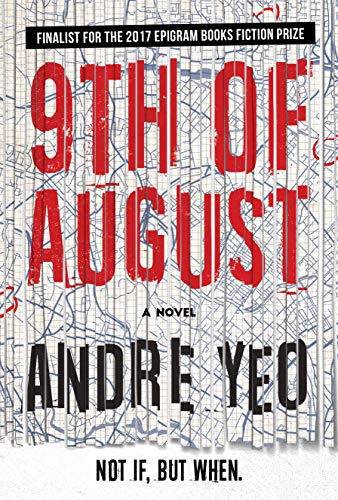One of the signatures of PulpRev is our cheerful disdain of conventional genre boundaries. Where traditional publishers see a dividing line between fantasy, science fiction, romance and other genres, we draw on the older traditions that blended various aesthetics to create exciting tales. We do not box ourselves in by arbitrary genre distinctions; we embrace the freedom to create the most awesome tales possible.
But sometimes, genre-blending goes too far.

A finalist of the 2017 Epigram Book Prize, 9th of August promises a thriller. The blub states:
Six suicide bombers have slipped into Singapore. Their mission: to set off explosives on the country’s 55th National Day.
They were sent by Tun, an Afghan with a tragic past. Trying to stop them is Inspector Rahim, who is tracking a new terror group. And caught up in the plot is Henry, a single parent whose wife revealed a terrible secret on her deathbed.
It’s a perfect setup for a counterterrorism thriller set in Singapore. The blurb promises a nefarious plot, a race against time, suspense, secrets, drama, all the elements of a first-rate thriller.
The prose delivers something else.
In the opening chapter, you learn that Rahim has failed. A bomb explodes in a train, causing havoc and destruction.
This undercuts thriller conventions from the start. People read thrillers because they want to experience a daring race against time. The outcome of the struggle between the terrorists and counterterrorists should be left in doubt up until the last possible moment, with both sides doing everything in their power to achieve their goals and foil the other side. By starting with an explosion, you’re telling the reader that the good guys will lose. The only question is how badly.
Without the possibility of a total victory, a final triumph of good over evil, many thriller readers won’t want to touch the story. Certainly I wouldn’t. The counterterrorist thriller novel traces its roots to crime fiction, whose raison d’etre is to show a determined, intelligent protagonist tracking down a criminal and setting things right by either avenging a crime or preventing one. Indeed, many counterterrorism novels are shelved as ‘crime fiction’. The good guys may not always win, they may not always get a golden ending, but at least there exists the possibility of complete triumph to keep the reader engaged. If the only question is how badly the good guys will lose, it’s not a counterterrorism novel any more.
And 9th of August most certainly isn’t.
The second chapter shows a schoolgirl wondering about her father. The next few chapters show other characters coping with everyday life. When Inspector Rahim shows up on the scene, he worries about basic bureaucratic nonsense and ends the chapter realising he’s forgotten the birth of his child.
There is no plot. There is no action. There is barely any character interaction to speak of.
This is not a thriller. In thrillers, the events of the first chapter sets the plot in motion, and the action doesn’t let up until the final chapter. Thrillers require constant forward momentum. There is no room in a thriller for anything that isn’t connected to the plot in some fashion.
The blurb promises a thriller. The prose reveals the story to be a slice-of-life drama-cum-character study. To a thriller reader, the opening chapters are too boring to hold his attention, and the sole action scene I encountered came too late and was too unrealistic, disjointed and slow-paced to satisfy his tastes. In contrast, a litfic reader wouldn’t be too interested in the violence, and the lack of character interactions, descriptions and depth wouldn’t satisfy him.
By improperly mixing tropes and approaches from both thriller and literary fiction, 9th of August fails to satisfy both readers.
Genre-blending isn’t necessarily bad. But to do it successfully, you must know what your audience wants, and deliver it competently.
Thriller readers want thrills. High-impact action scenes, protagonists doggedly chasing down the bad guys, treacherous plots, high stakes, excellent tradecraft, a final confrontation with evil. Literary fiction readers want to explore the beauty of the language, the poetry of everyday life, the lives of regular people, unique aspects of a society’s culture.
Their interests are so markedly different it is extremely difficult, if not outright impossible, to meet the needs of both at the same time.
By contrast, the pulp writers knew exactly what their audiences wanted. Their reader craved awe, wonder, excitement, intrigue, exotic locations, fantastic events. To these readers, aesthetics was secondary; it didn’t matter too much whether they were reading a story about adventurers seeking a lost city in a desert or a spaceship pilot wandering amidst planets teeming with alien life. If they got their dose of adventure, they were more than happy.
They key takeaway from 9th of August is that writers must know the preferences of their intended audience, and write to meet their expectations. Genre-blending is a viable strategy only if readers of those genres have similar wants and tastes. If you mix genres whose audiences have highly incompatible tastes, you’ll only end up with a product that satisfies no one.

If you want to see what true genre-blending looks like, check out my superhero story Hollow City. One part police procedural, one part superhero fantasy, with a dose of technology, tradecraft and martial arts, it is what you get when you cross Michael Connelly with the Punisher.
To stay updated on writing news and promotions, sign up for my mailing list here.
Leave a Reply